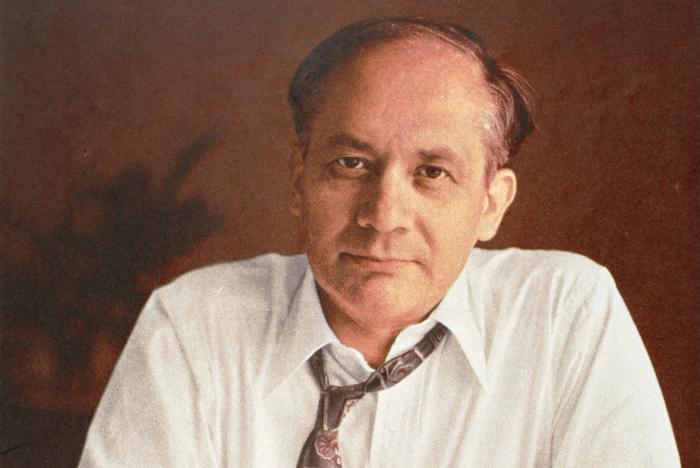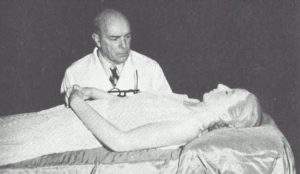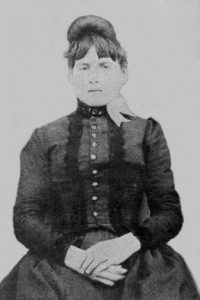
At a quiet New York cemetery in 1959, a handful of people stand around a fresh grave as a casket is lowered. Any passerby seeing the small somber ceremony might assume that the body belonged to a person of little significance. In fact, this casket carries the body of a man who is responsible for one of the largest shifts in international law in human history. Without his efforts, it is likely that the gravest crime mankind has ever committed and continues to commit would still be a crime without a name.
By the end of World War II, the Nazi regime had orchestrated the murder of over 17 million civilians in concentration camps throughout Europe. 1 Despite these egregious atrocities, no one at the time referred to the Holocaust as an act of genocide, not because it was not an appropriate descriptor, but because Raphael Lemkin had not yet coined the word and defined the crime for the world. The outcome of his personal crusade to encode ‘Genocide’ in an internationally recognized and binding Convention to which the US would sign on became his legacy (the US signed on decades after his passing).
Lemkin was born to a Polish-Jewish family in 1900 in a small village called Bezwodne in what was then The Russian Empire. Home schooled by his mother, he proved to be a brilliant scholar. By the time he received his undergraduate degree from Jan Kazimierz University he had learned over 14 languages and showed strong aptitude and interest in international law. After a career as a prosecutor in Poland, he was forced to flee to Sweden to evade capture by the Nazi forces in 1939. However 49 of his relatives were tortured and/or killed, drops in the ocean of inhumanity that was the Holocaust. 2

After fleeing the Nazi invasion, Lemkin eventually made his way to the United States. There he became a prolific professor, lecturing at the law school at Duke University in 1941 and the School of Military Government at the University of Virginia in 1942. He also served as an adviser to the United States War Department specializing in international law. 3
The world first became aware of Lemkin’s concept of genocide after the publication of what would arguably be his most important work, Axis Rule in Occupied Europe, in 1944. Primarily a legal analysis of the behavior of Nazi Germany in occupied territories during World War 2, the book also contained a full definition of the crime Lemkin dubbed “genocide.” 4 After this publication, Lemkin dedicated the rest of his life to getting the international community to acknowledge genocide as a crime under international law.
Lemkin drafted a resolution for a treaty which would officially ban genocide under international law. He then took his resolution on the road, presenting it to any nation which would hear him, hoping to garner enough support to endorse a convention on the subject. After years of lobbying the international community, The United States UN delegation agreed to present Lemkin’s resolution to the General Assembly. Dubbed “The Convention on the Prevention and Punishment of the Crime of Genocide,” the resolution was adopted on December 9th, 1948. It would be another 3 years before enough countries signed on the the convention to make it enforceable. Much to Lemkin’s dismay, The United States was not one of the first 20 signatories. 5

Lemkin dedicated the rest of his life to lobbying those nations which had not yet signed onto the convention, with the United States being his primary target. He invested every moment of his time and every cent of his modest wealth to landing that particular white whale. He eventually died of a heart attack, impoverished, unemployed, and underappreciated, in 1959. His funeral was a small affair, reportedly only attended by 7 people. 6 Yet, today, the is no Law School, no class that teaches Human Rights, nor any conversation of World War II and any of the subsequent Genocides that does not mention his name. More importantly, the Convention provided some tools to prevent or punish such cases.
The greater legacy of his life’s work would not be realized until several decades after Lemkin’s death. The United States would eventually sign the Genocide Convention, but not until 1988. The international community would eventually convict a man of the crime Lemkin coined, but not until the International Criminal Tribunal for Rwanda in 1998 which found Jean-Paul Akayesu guilty of the Rwandan genocide. Three years after that, Radislav Krstic was similarly convicted for the murder of 8,000 Bosnian Muslims in Yugoslavia. 7 Though he died nearly 40 years too early to see the fruits of his labor truly flourish, we can hope that his soul finds solace in the fact that, thanks to him, these heinous actions have a name and are viewed the world over as being among the worst crimes humanity has ever known. Eradicating the crime of genocide still eludes us but at least accountability is now more widespread around the world. 8
- Donald Niewyk and Francis R. Nicosia, The Columbia Guide to the Holocaust (New York: Columbia University, 2000), 43. ↵
- Raphael Lemkin and Donna-Lee Frieze, Totally Unofficial: The Autobiography of Raphael Lemkin (New Haven: Yale University Press, 2013). ↵
- Robert Bliwise, “The Man Who Criminalized Genocide,” Duke Magazine, November 14, 2013, http://dukemagazine.duke.edu/article/man-who-criminalized-genocide . ↵
- Rafael Lemkin, Axis Rule in Occupied Europe: Laws of Occupation, Analysis of Government, Proposals for Redress, (Washington D.C.: Carnegie Endowment for International Peace, Department of International Law, 1944) pg. 79. ↵
- Raphael Lemkin and Donna-Lee Frieze, Totally Unofficial: The Autobiography of Raphael Lemkin (New Haven: Yale University Press, 2013). ↵
- Jay Winter, “Prophet Without Honors” The Chronicle, June 3, 2013, https://www.chronicle.com/article/Raphael-Lemkin-a-Prophet/139515 . ↵
- Robert Bliwise, “The Man Who Criminalized Genocide,” Duke Magazine, November 14, 2013, http://dukemagazine.duke.edu/article/man-who-criminalized-genocide . ↵
- United Nations, “Convention on the Prevention and Punishment of the Crime of Genocide,” United Nations Treaty Collection, 78:1, 1021 (9 December 1948), New York: United Nations, 1951, 278-311. ↵



196 comments
Kaitlyn Killebrew
This article is written very well but I think there is a grammatical error in the seventh paragraph, right where you use your sixth source. We never really think about the people who create our words, especially when the specific term genocide is so powerful. To have the strength to leave his home and coin a term that has impacted him so close to home, in regards to his family being captured by the Nazi’s, is just astounding. It’s sad that he died of a heart attack before he saw his work unfold.
Cynthia Rodriguez
I really enjoyed reading about Dr. Raphael Lemkin and what he did for international law. I never knew that he was the one behind the word ‘genocide.’ I think it is awesome that Lemkin was greatly intelligent and that he learned over 14 languages. It is so sad that several of his relatives were captured, but I am glad that he was able to flee and acted as an adviser in international law. I admire that despite his loss, he dedicated his life to getting genocide to be recognized as a crime. This was a great article and it was very well-written
Sienna Guerra
This is very heartbreaking to know that Raphael Lemkin spent his life going for peoples humans rights and he died before being able to see the impact he made. It is very interesting that there was no concept of murdering a mass number of people to wipe them out before Lemkin. Something I found shocking was how long it took the United States to sign on with his treaty, but it’s good that they finally did!
Micaela Cruz
The legacy of Raphael Lemkin is one that goes unrecognized as the author alluded to, and it’s a shame that that is the case as he made a huge contribution. Lemkin’s background was fascinating to learn about seeing that relatives of his family were killed during the Holocaust, and then later how he went on to create the term “genocide” based off of the tragedy that impacted his family. What I found shocking was how long it took the United States to sign on with his treaty, but it’s good that they eventually did. A great article!
Daniela Cardona
This article has my favorite introduction by far. It is gripping and creates a vivid image in my head. The rest of the article is very well written as well. It’s really cool to think of coming up with something that will last for ages. Not many can say they are the first to think of or invent something that doesn’t come in another form already. What stuck out to me most about this article was the trouble it took to ban mass murder, seems like it should be a simple decision for anyone with a heart or a sound mind.
Natalie Thamm
This is an awesome article, and the introduction was a really cool way to draw the reader in. It is so interesting that before Raphael Lemkin, there was not a real concept or word for the mass murder of peoples with the purpose to wipe them out considering it was something that happened years prior with the Armenians. It is heartbreaking that he spent his life championing for so many peoples human rights and he died before he was able to see his impact.
Rebecca Campos
I had never heard of this incredible individual until reading this article. Raphael Lemkin fought to make genocide a crime and to fight for those who could no longer fight for themselves. The author wrote a very nicely done article about this individual who was definitely not given the recognition that he deserved. The initiative he took to get the victims the justice they deserved was an incredible deed and it would have been even better if he was able to see his livelihood succeed. While he may have had a small funeral here on earth, I’m sure he is being eternally celebrated.
Engelbert Madrid
This article does a great job on emphasizing the importance of Lemkin’s Genocide Convention that is meaningful to our world today. Lemkin’s background life is significantly essential for the reader to understand why Lemkin believed that dictators and leaders that were responsible for any genocide should be punished for their inhumane acts. I enjoyed reading this article, because one of my favorite subjects that I love to read and learn is history.
Luis Magana
I have never really heard about Raphael Lemon until I read this article. He made it his passion and dedicated time and effort so mass murders would come to an end and not continue. when he died of a heart attack he deserved a lot more recognition and appraisal than he actually received after his death. If it wasn’t for him we still wouldn’t know how to phrase or describe a mass killing which is coined as genocide now.
Ximena Mondragon
Overall, this article is very well written and the transitions are great. It is also very engaging and provides lots of information for readers. This topic is interesting because I never knew who actually came up with this term. He actually made a huge contribution to the Human Rights violations terms and if they could define it they could identify. If they could identify it the United Nations could do something about it .